Zeyi Tao
C2AL: Cohort-Contrastive Auxiliary Learning for Large-scale Recommendation Systems
Oct 02, 2025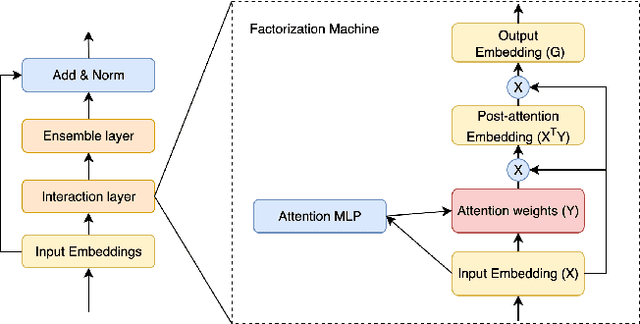



Abstract:Training large-scale recommendation models under a single global objective implicitly assumes homogeneity across user populations. However, real-world data are composites of heterogeneous cohorts with distinct conditional distributions. As models increase in scale and complexity and as more data is used for training, they become dominated by central distribution patterns, neglecting head and tail regions. This imbalance limits the model's learning ability and can result in inactive attention weights or dead neurons. In this paper, we reveal how the attention mechanism can play a key role in factorization machines for shared embedding selection, and propose to address this challenge by analyzing the substructures in the dataset and exposing those with strong distributional contrast through auxiliary learning. Unlike previous research, which heuristically applies weighted labels or multi-task heads to mitigate such biases, we leverage partially conflicting auxiliary labels to regularize the shared representation. This approach customizes the learning process of attention layers to preserve mutual information with minority cohorts while improving global performance. We evaluated C2AL on massive production datasets with billions of data points each for six SOTA models. Experiments show that the factorization machine is able to capture fine-grained user-ad interactions using the proposed method, achieving up to a 0.16% reduction in normalized entropy overall and delivering gains exceeding 0.30% on targeted minority cohorts.
Preconditioned Federated Learning
Sep 20, 2023Abstract:Federated Learning (FL) is a distributed machine learning approach that enables model training in communication efficient and privacy-preserving manner. The standard optimization method in FL is Federated Averaging (FedAvg), which performs multiple local SGD steps between communication rounds. FedAvg has been considered to lack algorithm adaptivity compared to modern first-order adaptive optimizations. In this paper, we propose new communication-efficient FL algortithms based on two adaptive frameworks: local adaptivity (PreFed) and server-side adaptivity (PreFedOp). Proposed methods adopt adaptivity by using a novel covariance matrix preconditioner. Theoretically, we provide convergence guarantees for our algorithms. The empirical experiments show our methods achieve state-of-the-art performances on both i.i.d. and non-i.i.d. settings.
Scalable Quantum Neural Networks for Classification
Aug 04, 2022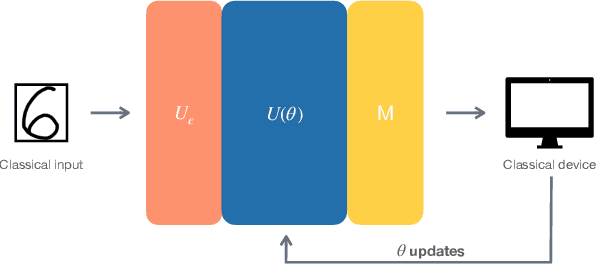



Abstract:Many recent machine learning tasks resort to quantum computing to improve classification accuracy and training efficiency by taking advantage of quantum mechanics, known as quantum machine learning (QML). The variational quantum circuit (VQC) is frequently utilized to build a quantum neural network (QNN), which is a counterpart to the conventional neural network. Due to hardware limitations, however, current quantum devices only allow one to use few qubits to represent data and perform simple quantum computations. The limited quantum resource on a single quantum device degrades the data usage and limits the scale of the quantum circuits, preventing quantum advantage to some extent. To alleviate this constraint, we propose an approach to implementing a scalable quantum neural network (SQNN) by utilizing the quantum resource of multiple small-size quantum devices cooperatively. In an SQNN system, several quantum devices are used as quantum feature extractors, extracting local features from an input instance in parallel, and a quantum device works as a quantum predictor, performing prediction over the local features collected through classical communication channels. The quantum feature extractors in the SQNN system are independent of each other, so one can flexibly use quantum devices of varying sizes, with larger quantum devices extracting more local features. Especially, the SQNN can be performed on a single quantum device in a modular fashion. Our work is exploratory and carried out on a quantum system simulator using the TensorFlow Quantum library. The evaluation conducts a binary classification on the MNIST dataset. It shows that the SQNN model achieves a comparable classification accuracy to a regular QNN model of the same scale. Furthermore, it demonstrates that the SQNN model with more quantum resources can significantly improve classification accuracy.
LAWS: Look Around and Warm-Start Natural Gradient Descent for Quantum Neural Networks
May 05, 2022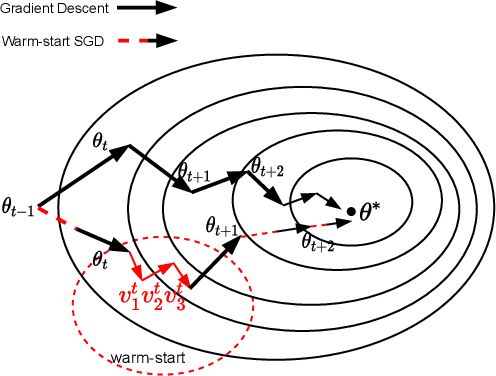
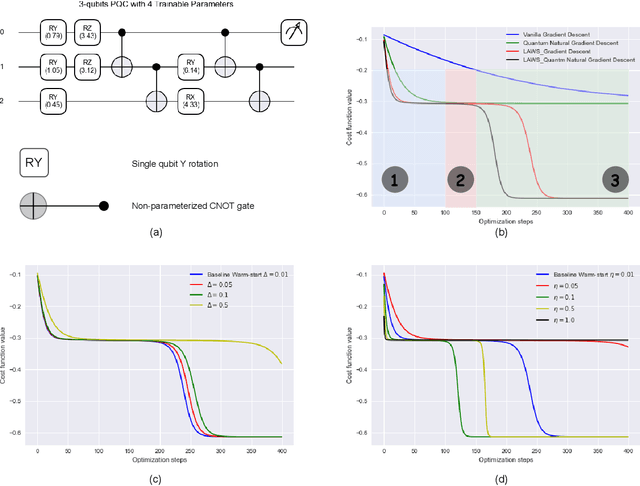

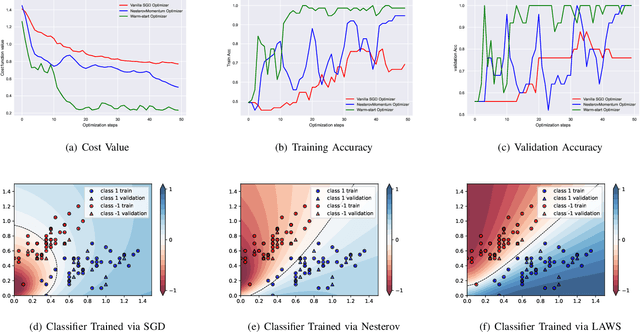
Abstract:Variational quantum algorithms (VQAs) have recently received significant attention from the research community due to their promising performance in Noisy Intermediate-Scale Quantum computers (NISQ). However, VQAs run on parameterized quantum circuits (PQC) with randomly initialized parameters are characterized by barren plateaus (BP) where the gradient vanishes exponentially in the number of qubits. In this paper, we first review quantum natural gradient (QNG), which is one of the most popular algorithms used in VQA, from the classical first-order optimization point of view. Then, we proposed a \underline{L}ook \underline{A}round \underline{W}arm-\underline{S}tart QNG (LAWS) algorithm to mitigate the widespread existing BP issues. LAWS is a combinatorial optimization strategy taking advantage of model parameter initialization and fast convergence of QNG. LAWS repeatedly reinitializes parameter search space for the next iteration parameter update. The reinitialized parameter search space is carefully chosen by sampling the gradient close to the current optimal. Moreover, we present a unified framework (WS-SGD) for integrating parameter initialization techniques into the optimizer. We provide the convergence proof of the proposed framework for both convex and non-convex objective functions based on Polyak-Lojasiewicz (PL) condition. Our experiment results show that the proposed algorithm could mitigate the BP and have better generalization ability in quantum classification problems.
 Add to Chrome
Add to Chrome Add to Firefox
Add to Firefox Add to Edge
Add to Edge